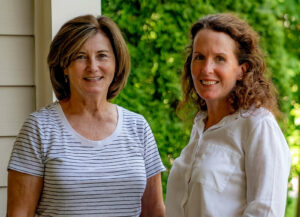Progressive Voice is a biweekly opinion column. The views expressed are solely the authors’.
By Anne deLeon and Mary Byrne
Last year, Americans were inundated with millions of political calls. Texting technologies added to the deluge: 2.72 billion political text messages were sent in September 2020 alone. Voters like long-time Arlington resident Donna Bierlein were drained by the onslaught, “It’s annoying to get called over and over again.”
Yet, the Arlington Democrats’ effort to get out the vote has been successful because it relies not just on calls to solicit support, but on building genuine connections with voters. Last year, our volunteers found a new way to be of service.
The Rides to the Polls team has provided transportation assistance to voters since 2008. Our group expected the emergence of Covid-19 and the intensities of the presidential election would impact our operation in 2020. Voting became more complicated, leaving seniors unsure about their voting options.
Seeking to correct our state’s reputation for being a difficult place to vote, the Virginia General Assembly passed bills to make it easier. Drop boxes for collecting absentee ballots were approved, funding for postage for mail-in ballots was provided and rules for becoming a permanent absentee voter were eased. Because of Covid-19, the witness requirement for absentee ballots was waived.
To help voters absorb the changes, our team decided to reach as many people as possible in advance of the election. Volunteers made thousands of calls, answering questions about voting rules, providing assistance with online ballot applications and offering rides.
As coronavirus vaccines became available in January 2021, we saw a similar need among seniors. Why not turn our Rides to the Polls operation into a Rides to Vaccines program?
More than 90 volunteers joined up — twice the number who usually volunteer for the Rides to the Polls effort. Our newcomers ranged from college students to 80-year-olds and included Democrats as well as Republicans.
For five months our tireless volunteers called more than 4,000 seniors, regardless of political party, helping with online vaccine registration as well as scheduling and driving to appointments. By the time our program wrapped up in June, our outreach expanded to non-English speakers. Victoria Virasingh reached out to Spanish-speaking neighbors, organizing information drops at homes and setting up registration tables at markets. Another volunteer organized and paid for rides for those needing disability-adapted transportation. Mesky Bhrane helped Amharic speakers, collecting multiple blessings along the way.
Seniors were reassured by our safety protocols, which included mask requirements for drivers and passengers, surface-cleaning between rides and open windows during travel. Our volunteers built trust, checking in before and after appointments and offering their personal phone numbers for follow-up calls. Colleen Boles had multiple conversations with more than one vaccine-hesitant resident, providing the information and support they needed to become comfortable making an appointment.
Our project succeeded because it was rooted in connection and concern. We concentrated on those who “fell between the cracks,” helping those who lacked computer access, were confused about conflicting information provided by the media or needed safe transportation. Some seniors expressed surprise to know a neighbor cared enough to find and call them. Turney Tse said, had we not called, her 100-year-old mother would not have been vaccinated.
Retired California Congressman Vic Fazio, who now lives in Arlington, also appreciated the call. “I thought it was a great effort showing empathy, interest and concern.” Fazio suggested the impact of efforts like ours might have lasting impact. People learn “there’s more to a political party than platform and issues,” when people feel “recognized, noticed, cared for.”
If pivoting a small but effective effort like the Arlington Democrats’ Rides to the Polls program toward non-political community service can build goodwill in times of crisis, why not apply the model more broadly in normal times? “In a period when cynicism reigns and people are mistrustful,” DeFazio says, outreach rooted in common interest, concern for the individual and care for community can be key to engaging people one by one, neighbor to neighbor.
Long-time Arlington residents Anne deLeon and Mary Byrne are both former Capitol Hill staffers. They lead the Arlington, Va. Democrats’ Rides to the Polls team, which has provided transportation assistance to voters since 2008.


